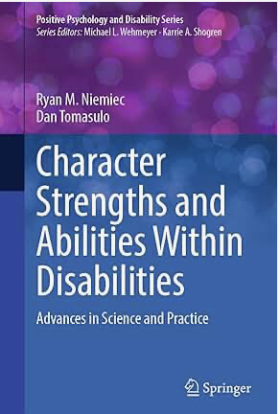Ryan M. Niemiec, PsyD, is author or co-author of nine books, an award-winning psychologist and a widely traveled international speaker. Ryan is the creator of MBSP and has led hundreds of mindfulness groups over the last two decades. As education director of the global nonprofit, VIA Institute on Character, he's a leading voice in the education, research, and practice of character strengths. He lives with his family, which includes three young and zestful children, near Cincinnati, Ohio.
Character Strengths and Abilities Within Disabilities: Advances in Science and Practice
Learn the latest science and applications of character strengths to understand, support, reframe, and study a wide range of disabilities.
This book examines the science and practice of character strengths as the backbone for understanding, studying, and applying positive interventions across a wide range of disabilities. It explores character strengths as positive personality qualities most central to an individual’s identity that create positive outcomes for building well-being and managing adversities and contribute to the collective good. The book recognizes disability as a part of the human experience that can emerge for anyone and the necessity for examining and applying strengths-based approaches. It explores what is known about character strengths and various disabilities from a science and practice perspective. It covers a wide range of disabilities, including intellectual/developmental disability, autism, physical disorders, medical disorders, and various psychological disorders, with specific chapters focused on trauma and also ADHD. The book also offers a comprehensive primer on character strengths and on strengths-based approaches (in general) for disabilities. There is also a special focus on intellectual/developmental disabilities, in terms of dual-diagnosis, justice-equity-diversity-inclusion (JEDI), and spirituality/meaning. Each chapter contains the following internal structure: • Chapter overview: a brief overview of the chapter’s contents and its purpose. • The concepts: the core ideas and areas to know about the chapter’s contents. • The science: the main scientific findings to date on the topic or population. • The practice: core practices, practical considerations, and elements of a strengths-based approach for that population or topic area. The focus of this section is on the strongest evidence or strongest base for that evidence which might be theoretical or hypothetical. The emphasis is the application of the science and core concepts. • Future directions: considerations for the science to advance, relating to the content discussed. • Key takeaways: a summary of important points in the chapter. • References
Meet the Author

Affiliate disclosure: As an Amazon Associate, we may earn commission from qualifying purchases from Amazon.com
